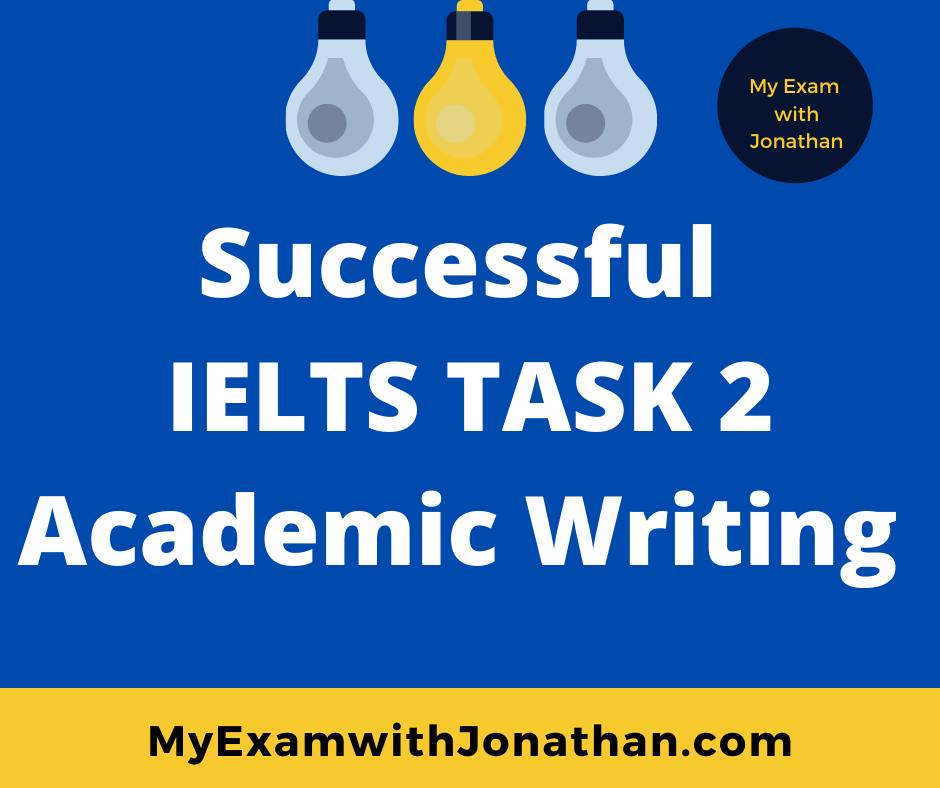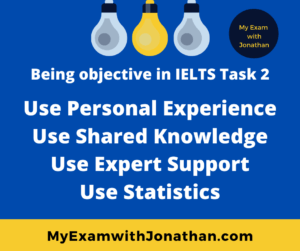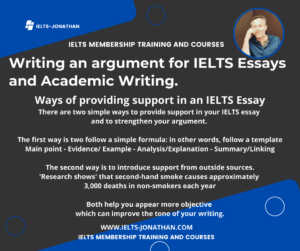Writing an argument for IELTS and Academic Writing.
The kind of writing we are going to describe here is ONLY suitable for IELTS Task 2 Writing and not IELTS Task 1.
Why is this?
Well, in an IELTS Task 1 report, you are not required to add additional opinions, or comments or speculate on reasons why figures or numbers might be the way they are.
In Task 1, there is no argument to write, you should only report the figures you can see.
Task 2 Writing
In a Task 2 essay, the task is completely different.
You have to respond to a prompt or preposition and often put forward ideas solutions or even measures.
A good way of improving your IELTS band score and a great way to substantially improve your writing is to be objective.
This is very different to subjective writing, where you only use your opinions or personal point of view.
If you try to be objective, you can provide support for your ideas, your opinions or when responding to the prompt given.
At times in your essay, you may still need to use the personal pronouns such as “we” and “I“. 🙁
You may find you can not avoid these words, but you should aim to be objective by using examples and explanations more than your subjective or personal viewpoint.
Writing objectively for IELTS
Compare these two sentences and then consider which is subjective and which one is objective.
It seems to me that people who continue to smoke in public places are rude and selfish.
It seems likely that those who continue to smoke in public places lack manners or are anti-social.
Compare these sentences and decide which puts forward examples and explanations and which is a personal viewpoint.
It is pretty clear that stronger punishments are needed. If these people were fined heavily or even threatened with a criminal record then this problem would disappear.
An effective way to deter people from smoking in public places might be to introduce more severe punishments. Heavy fines or even the possibility of a criminal record are examples of how this issue might be reduced.
Ways of providing support for objective IELTS Essay writing
There are two simple ways to provide support in your IELTS essay and to strengthen your argument.
The first way is two follow a simple formula: in other words, what you could say is a template, and the second is to introduce support from outside sources.
If you follow a template it will help you develop your ideas and will help you write with clarity.
A paragraph template for IELTS
A good piece of writing makes a point clearly and may illustrate it to help the reader understand.
To avoid rambling, plan the points in your essay argument and the evidence that you will use to illustrate your ideas, and only include the necessary detail.
Plan just one main point per paragraph and expand it like this:
P: Topic sentence introducing the point with essential detail.
E: Illustration of point using evidence: using an example.
A: Critical analysis of point and explanation.
L: Summing up the point, linking it to the question or your argument.
What not to do in an IELTS Essay
Academic writing tends to be impersonal in style.
It tries to be impersonal in order to be objective.
This may make it appear formal and students stress that they must use formal words and waste valuable preparation tie doing this.
My advice is to be certain about what words ARE informal and just get writing.
This is a far better solution.
Unfortunately, a bigger issue is that too many IELTS Candidates write in a subjective style.
If an IELTS Task 2 appears too subjective, this can affect the tone of the writing.
This can create a negative impression in the examiner and this can lower the essay band score.
This issue is a big problem in my country but it is pretty clear to me that stronger punishments are needed for dangerous driving offences. If these people were fined heavily or even threatened with a criminal record then this problem would disappear.
It is important to be aware and notice how academic writers express themselves and support their opinions, like this.
Dangerous driving is an issue in many countries, however it seems clear that stronger punishments are needed for the most dangerous driving offences. If offenders were fined heavily or even threatened with a criminal record then this problem in general would most likely be reduced.
How can you support you effectively ideas
Support consists of evidence.
Here are four kinds of evidence you can use to make your argument stronger:
1. Example: from your own experience or from what you heard or read.
2. Common Sense: things that you believe everybody knows.
3. Expert Opinion: the opinions of experts or professionals
(e.g. scientists or doctors) — this comes from research.
4. Statistics: numbers (e.g 75% ) — this also comes from research.
Writing a supported argument
Read the arguments for the following statement:
Statement: “Smoking should be banned in all public places”
This is the position I am going to take.
Position: Agree
So, now I am going to agree with this statement by providing an example.
1. By Example:
For example / for instance / let me give an example
“Let me give an example: Whenever I go to a restaurant or bar and there are people smoking near me, I feel that I am breathing in their smoke. This makes me a smoker even though I don’t want to be”.
or by providing a shared belief
2. Common Sense:
Everyone knows / it’s common knowledge that / it’s no secret that
“It’s common knowledge second-hand smoke is very unhealthy for non-smokers”.
or by providing figures or percentages.
3. Statistics:
“Second-hand smoke causes about 250,000 respiratory infections in infants and children every year, resulting in about 15,000 hospitalizations each year”.
or by provide the voice of another.
4. Expert Opinion:
According to…/ to quote…/ the book _____ says…
“According to the Environmental Protection Agency, second-hand smoke causes approximately 3,000 lung cancer deaths in non-smokers each year”.
A balance of objectivity and time in the exam
For the IELTS test, there is not enough time or number of words to allow a completely written IELTS essay in an academic style.
The ‘take home‘ to remember is to aim for a balance.
So remember, although IELTS writing is not informal, it is much more semi-academic in style.
Other things to avoid in your IELTS essay.
Your writing should be formal, but it does not need to be over sophisticated.
To be formal, there are various colloquialisms and shortened forms to avoid:
Avoid shortened forms:
Shouldn’t, it’s for it is
Avoid phrases or cliches such as:
at the end of the day; in a nutshell; when it comes to the numbers
Replace with: finally, in summary, in a crisis
Avoid colloquial words such as:
literally, really, okay, maybe.
Avoid rhetorical questions
Don’t pose questions to the IELTS examiner, for example
‘Wouldn’t you feel happier if you could wear what you want at school?’
Avoid emotive language
Don’t use language that appeals to emotions, for example,
‘Many children are forced to suffer the indignity of wearing clothes that do not match their personal style.’
The essay should be a considered, objective response.
Avoid Hyperbole
Don’t use exaggeration purely for effect, for example,
Millions of school children every year ………
What you should do in the IELTS Exam
You do not have much time, but planning the paragraph structure is the key to a higher writing score.
Remember to only plan one main point per paragraph using the PEAL format:
P: Main point with essential detail.
E: Evidence of the point using an example.
A: Analysis of point and explanation.
L: Linking to the question or your argument with a summary. 🙂
That’s it on preparing a strong argument that free from distractions.
I hope that you found this information valuable and you have taken on board some of the tips.
I would appreciate if you could share this to someone you know.
I also recommend taking a look at my free blog below, or join my IELTS Membership Course which gives further instruction on how to give that perfect Task Response:
The Best Approach to Task 2 Writing Paragraphing in Task 2 Writing Writing – Benefits of a Foreign University Education I’m Jonathan I’ve taught IELTS and University English in more than a dozen universities and schools around the world. I’m a parent, traveller and passionate about language teaching and helping students achieve their dreams. Whilst living in Austria or working in Asia, I run IELTS courses to help students get to where they want to be. If you are serious about IELTS, connect with me to see how I can help you.






Was this helpful? Leave a comment :)